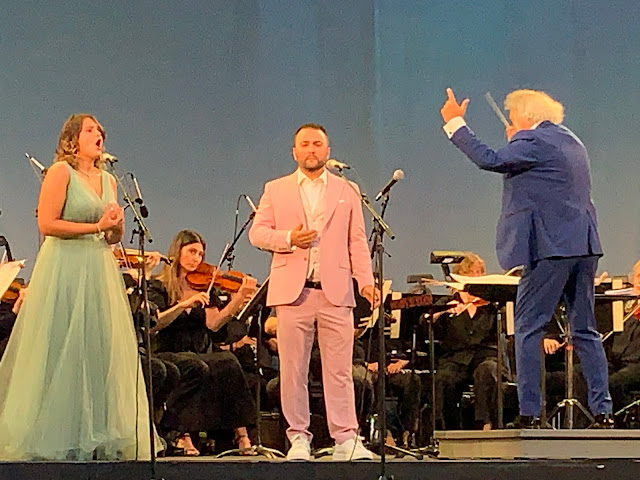MISSION
Sunday, August 27, 2023
GEORGINA WU (WOO!)
Thursday, August 24, 2023
THE SOUL OF UKRAINE
Sunday, August 20, 2023
A REAL CROWD PLEASER
Saturday, August 19, 2023
A NATURAL PROGRESSION--VIENNA TO BROADWAY
Sondheim's "A Weekend in the Country" outdoors in Bryant Park presented by New York City Opera
(Matthew Ciufitelli, Kristin Sampson, Drew Seigla, Sami Sallaway, Michael Nansel, and Devony Smith)
It is one thing to have a strong opinion; it is quite another to have your opinion brought to life and validated. We have long held the opinion that the line of inheritance goes from opera to operetta to Broadway, and not to the contemporary works that are called "opera". The public-pleasing works of the 19th c, the charming operettas of Vienna and later Broadway (think Victor Herbert), all morphed into the works of Rodgers and Hammerstein, Lerner and Loewe, Bernstein, and Sondheim.
In a most unfortunate technological advance, sound amplification removed the need for operatically trained voices and much of Broadway became ear crushing. Meanwhile, operatic voices have assumed the role of keeping the classics of the opera canon alive for an unfortunately ever-diminishing audience, whilst managers of opera companies have moved toward presenting contemporary works of dubious merit with "relevant" stories better told at the theater, prosy libretti, and mostly tuneless music.
The critics may rave over the new works, the opera houses fill up, audiences come once but not twice. Ticket sales are declining with the public unwilling to spend their hard earned dollars on entertainment that isn't entertaining. Meanwhile, tourists come from all over the world to see Broadway shows in which the stories are direct and the music tuneful. Moreover, many shows in the Broadway canon have become classics and interest is renewed with successive generations wanting to see the shows, or at least films of the shows (think West Side Story). Of course, not every show is a good one. But not every bel canto opera was a hit either. For every Il barbiere di Siviglia there were dozens of operas that failed or lasted but a season.
We have long wished for a company here in New York City that would present the Broadway canon unamplified with operatic voices. We will never forget New York City Opera's production of Candide. And last night it was the same institution that gave us a taste of what we wish for--operatic voices singing the best of Viennese operetta and Broadway.
It was indeed a gift from New York City Opera to New Yorkers who packed Bryant Park from one end to the other for a picnic performance. In an outdoor environment, voices must be amplified which we fully understand. Often the vibrato of the singers seemed exaggerated and we would be hard put to comment on the individual voices.
That being said, we enjoyed the concept which supported our opinion. Of course we did! And we enjoyed the performances, many of which were dramatically valid. The material was well chosen and the audience was enthralled.
The most unforgettable performances were given by Michael Nansel, heretofore unknown to us. He impressed us in the well known aria from Leigh/Darion's Man of La Mancha--"The Impossible Dream", and as Tony in Loesser's The Most Happy Fella singing a soliloquy addressed to his dead mother. Similarly, Bock/Harnick's Fiddler on the Roof gave Drew Seigla an opportunity to charm us with Motel's aria "Miracle of Miracles". Matthew Ciuffitelli brought Billy Bigelow to vibrant life in the soliloquy from Rodgers/Hammerstein's Carousel. All of these shows (operas? operettas?) were before our time and we were absolutely thrilled to hear them, having only heard recordings.
Lehár's The Merry Widow has fortunately stayed in the repertory for well over a century and we were delighted to hear Kristin Sampson singing the beautiful aria "Vilja". We must say, however, that we far prefer to hear it sung in German. Victor Herbert is well known to us from the regular performances by the rapidly growing Victor Herbert Renaissance Project Live (known as VHRPL!) which has no trouble attracting an enthusiastic audience. It was a pleasure to hear Sami Salloway sing "Art is Calling for Me" from his The Enchantress.
The music of Borodin is well loved by us and hearing one of his famous tunes (adapted for the show Kismet and entitled "And This is My Beloved") gave us pleasure. We hope Ms. Sampson enjoyed singing it as much as we enjoyed hearing it. Sondheim's Follies gave Devony Smith a great aria to sing as well--"Losing My Mind".
It must have been quite a challenge to select all those goodies from the grand buffet of operettas and Broadway. The evening was nearly two hours long and we could have listened all night. We kept thinking of so many wonderful shows that could have been included. Let's hope that there will be more evenings like this!
The evening ended on a high note, so to speak, with the cast assembled for the Act I finale of Sondheim's A Little Night Music--"A Weekend in the Country", reminding us of all those wonderful Rossini ensembles from two centuries ago. It's good to know that we are still creating classics!
© meche kroop



